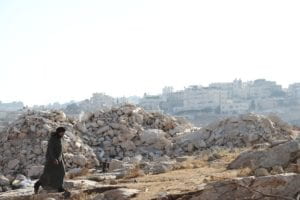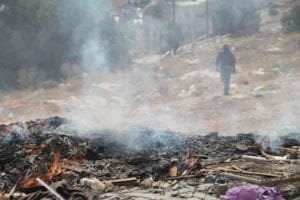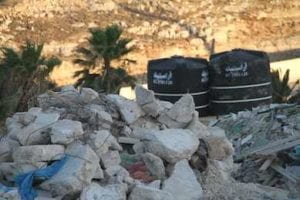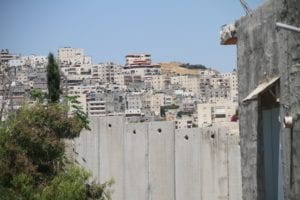Joyce Mishaan
Fellowship Location: Israel / Occupied Palestinian Territory
Israeli Committee Against House Demolitions
“You really have to see things on the ground to understand what’s going on here,” said my supervisor, Michael, over lunch on my first day working with the Israeli Committee Against House Demolitions (ICAHD). ICAHD is an Israeli peace and human rights organization working towards an end to the Occupation and the achievement of a just peace between Israelis and Palestinians. In particular, ICAHD focuses on resistance to Israel’s policy of demolishing Palestinian homes in the Occupied Palestinian Territory.
I took these photos on my tour with ICAHD through Anata, a Palestinian town in the West Bank, north-east of Jerusalem in Area C of the occupied territory. It was my first look “on the ground” at the effect of Israel’s policy of demolishing Palestinian homes in the West Bank and East Jerusalem. Anata is a town full of rubble. It’s a town where you’ll find piles of trash burning regularly, because there is no regular municipal trash collection. It’s a town where black water-barrels dot the landscape, brought in by residents to cover the 4 days per week that their water supply is cut off. It’s a town where the separation wall runs behind family homes and a local schoolyard.
There are a lot of ways to talk about the occupation and, depending on where you’re standing, the narratives can diverge sharply. In the U.S. and inside Israel, the narrative on the occupation centers on security. Policies and practices are hinged on this security framework, while waiting in line at checkpoints, standing amid the wreckage of a demolished home, crossing from one side of the separation wall to the other, you’ll find a very different narrative.
This is, simply, the perspective standing here on the ground in Anata. These images and the story they tell are a direct result of Israel’s policies and practices in East Jerusalem and the West Bank.
I have spent much of my time in Israel and Palestine so far listening to these different narratives, trying to understand the many roadblocks in the way of reframing the public conversation from a security framework to a human rights framework, where the impact on the daily life of Palestinians, their right to adequate housing, their right to self-determination and their right to nationality (to name of a few of the human rights in question here) are placed at the center.
This week we begin ICAHD’s rebuilding summer camp, where over 30 internationals from North America and Europe will join Israelis and Palestinians to rebuild Beit Arabiya, the home of Salim and Arabiya Shawamreh, and their 7 children, which has been demolished by Israeli authorities five times since 1998. The family applied three times to the Israeli Civil Administration for a building permit (with a $5,000 fee per application) and was refused each time, as were 94% of Palestinian permit applications since 1993. During an evening discussion with ICAHD’s founder, Jeff Halper, we looked at Salim and Arabiya’s situation as a case study: why demolish this home? Within Israel’s security framing, it’s hard to answer this question. Of the 26,000 Palestinian homes demolished since 1967, only 600 of them were security-related.
Re-framing the narrative will be an ongoing question for me throughout this project. In the mean time, I hope some of these photos can speak for themselves.



